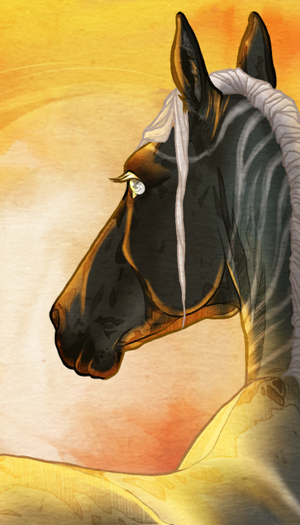
SORROW WILL HAVE AN END
No don't think what the songs think. Just think how they sound.
When she sees Eik, the soft greys of his coat broken into sunlight and shadow, Seraphina wants to cry; she wants to reach out and touch him, to reassure herself that he is solid. (She did not know, in the time they were apart, if he was alive or dead.) But she does not cry. The corners of her weary eyes burn with pent-up tears, but she has forgotten how to cry.
If she cries, Raum wins. She knows this. She knows, too, that he has already won – that she is already a broken, discarded husk of the silver queen who died on the Steppe, a snakeskin shed and left behind by the snake.
But there is still a sob that grows in her throat and presses against her teeth when he steps into the clearing. There is still a sob that begs to be let out – and, with it, the image in the back of her mind of herself, kicking up sand in her wake, cascading across the clearing and pressing her forehead to his shoulder, where his mane meets his skin, and letting herself mourn in the way that the twisted-up residue of Seraphina that lingers inside of her chest longs to.
She does not move from her place in the shadows. She feels like she is dead.
If there is any part of her that is still queen or any part of her that wants to win this war, she knows that she cannot let herself grieve. Oh, but she wishes that she could. She aches for the touch of a friend, for something softer, for some warmth – that thing inside of her, ravenous and burning, devours every little kindness she receives. She wishes that she could mourn her dead. Instead, they build up inside of her, her ribcage a little sepulcher, but she does not cry. She cannot cry. In her mind’s eye, she cannot shake the image of Rhoswen, her spine illuminated by the peach-gold glow of flames; in her mind’s eye, she cannot shake the fragile image of her newborn girl, a daughter that she will orphan. She wonders what daughters she has already orphaned, in her raids on Raum’s guards and soldiers. She wonders what daughters she has orphaned through her indifference, or her cruelty, or her failure. The dead and the dying still watch her, glass-eyed, wherever she goes, and she is not sure if she has become revenant or reaper.
So, see – she is bloody. (When has she not been bloody?) She is bloody, and, if she hopes to put an end to this, she must make her peace with orphans and ghosts.
She takes an unsteady step forward, mouth as dry as desert stand. Not out into the light – not yet. Under the heavy overhang of shadows, she is grey enough to be spectral or disappear entirely.
Burning one, Eik calls her, and she thinks back to their conversation in the library, when the world was simpler and a little bit kinder. Her Emissary, one of her only friends, one of the only people she trusted, that she still trusts. (Kind to her, and knowing, in spite of all of her edges.) Burning one, he says, and she wants to tell him yes, that she is still here – that she is still the Seraphina he knew, the Seraphina he met so many years ago. She wants to be that Seraphina, for him.
That is not what comes out of her mouth.
“I don’t…” and her voice almost breaks, but she holds it tight to her chest and does not let it fall apart, even as she takes a nervous step forward, out of the shade. The grotesque gnarl of scars – plated pretty, ornamental gold, as though it could guise the violence of them – gleam in the dying sunlight as she allows her hood to fall back against her shoulders. Her eyes drift to the canyon floor; her chest constricts in shame. Even if he dies, she will never be able to escape what he did to her. Even if he dies, and even if she kills him, and even if Solterra is freed, she will have her failure raked into her skin forever. In that way, she will always be possessed. She will always belong to one evil man or another – she will always be the legacy of the Viceroy, or of Zolin, or of Raum.
She has shed her collar, but she will never be free.
“I don’t know.”
In a sense – there she is, material and alive, returned from the grave to stand before him.
But in a sense – she is gone. In a sense, those aren’t her eyes, even though they belong to her, and that isn’t her face, even though it should be.
And if she is burning, she is burning alive, like a house on fire – strangled by smoke and heat.
@
"Speech!" || "Ereshkigal!"

I'M IN A ROOM MADE OUT OF MIRRORSand there's no way to escape the violence of a girl against herself.☼please tag Sera! contact is encouraged, short of violence

